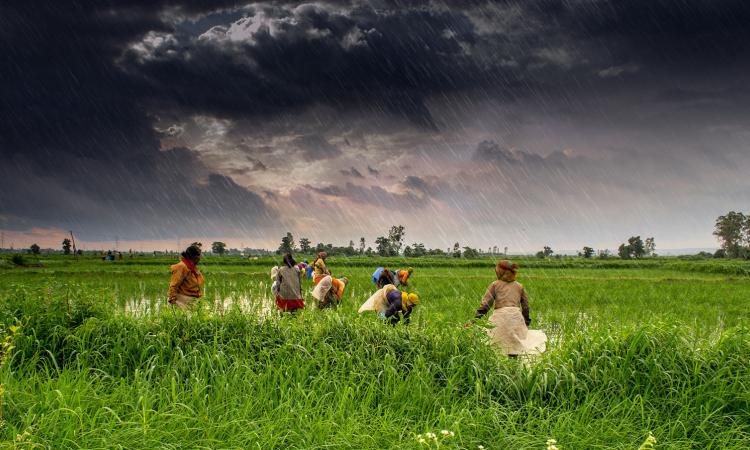
Madhya Pradesh's climate smart villages provide lessons in climate change adaptability
A Climate Smart Village project initiated by the state government on natural farming in Madhya Pradesh villages has yielded highly successful results setting an example for other villages in India to follow.
The initiative was launched in three districts of Madhya Pradesh – Sehore, Satna and Rajgarh for a duration of five years. The project aimed at encouraging farmers to use innovative methods of natural farming, reducing carbon emissions from agriculture, and improving yields with measures such as soil and water conservation and cultivation of drought and flood-tolerant seeds.
Farmers were given micro fertilisers and seeds that produced yields even in adverse weather conditions. Mulching polythenes to cover the roots of the plants were distributed among farmers to reduce water loss due to evaporation. Techniques like digging ponds in the fields, direct seeding of paddy, cultivation of pulses and soybeans in raised beds and composting instead of stubble burning were introduced along with use of cow dung manure and cow urine.
Natural methods of cultivation not only reduced the costs, increased the quality of soil and crops and increased production, but also led to an increase in organic carbon in the soil. (Scroll)
NGT imposes a penalty on the Kerala government for its failure to protect Ramsar sites
The National Green Tribunal (NGT) has imposed a penalty of Rs 10 crore on the Kerala government for failing to protect the Vembanad and Ashtamudi lakes classified as Ramsar sites.
The wetlands harbour a rich variety of vegetation and wildlife as well as migratory birds, but have become highly polluted in recent years due to the dumping of pharmaceutical, plastic, household and slaughter house wastes and encroachments, which has led to destruction of their thriving ecosystems.
A recent study by the Kerala University of Fisheries and Ocean Studies has found that Vembanad lake’s water retention capacity has decreased by 85 percent in the last 120 years due to pollution and encroachments. Astamudi lake that has been classified as a Ramsar site since 2002 also needs urgent attention (Down To Earth).
Fisherfolk of Rameshwaram resist polluting shrimp farms on the island
Artisanal fishers of Ariyankundu in Rameswaram, Tamil Nadu have raised their voices against the shrimp farms behind their village for polluting groundwater, encroaching on their commons and not following government rules.
The landscape which was once fertile with coconut and palm trees and crops such as groundnut, corn and millet, now stands barren. The coast is now dotted with shrimp aquaculture farms that release polluted stagnant water into the landscape.
Ariyankundu residents argue that besides threatening their livelihoods, the shrimp farms are in violation of the Coastal Aquaculture Authority Act, 2005, which prevents aquaculture from being carried out within two hundred meters from High Tide Lines and that farms situated on the shore at Ariyankundu have not adhered to that limit. The diggers and excavators used to make the land surface even have destroyed many precious coral formations, which protect the sea from erosion and fish populations that come to breed near the corals.
The residents inform that the shrimp farms have also not adhered to the CAA Act requirement which says that the shrimp farms must treat the post-harvest water before releasing it back into the ocean, in order to avoid adverse impact to the environment and the ecosystem. (Mongabay, India)
Warm Arctic conditions linked to intense rainfall over the Indian subcontinent: Study
A recent study finds that changes as far as the arctic are linked to rainfall changes over India. As a part of the study, scientists reconstructed the past 1000 years of climate history from the Arctic, a region that has been found to be warming faster than any other place on the planet.
The study detected warm and cold climatic spells in the Arctic over the past 1000 years and found that warm conditions in the Arctic were linked to intense rainfall over the Indian subcontinent while cold conditions were associated with weak spells of rain over the subcontinent.
Presently, the Indian monsoon’s year-to-year variations are primarily driven by tropical factors. However, the Arctic’s influence on the short-term variability of the Indian monsoon may become more significant as the region experiences further warming finds this first time study. (Mongabay, India).
This is a roundup of important news updates from March 16 - March 31, 2023. Read our policy matters this fortnight here.
/articles/madhya-pradeshs-villages-lead-way-climate-smart-agriculture